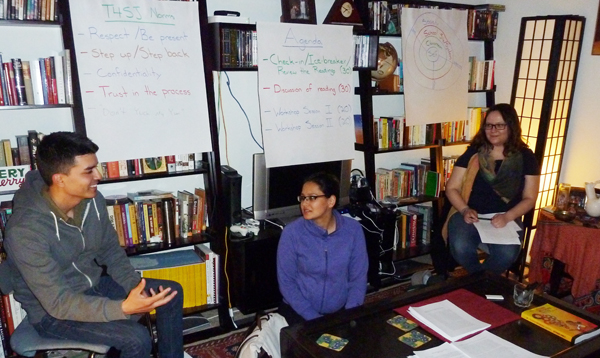by Grace Cornell Gonzales
 Last year, during a Teachers 4 Social Justice salon in San Francisco, I read Henry Giroux’s “Teachers as Transformative Intellectuals” for the first time. It’s a very academic article but, after pushing through the dense language, I took away a valuable message. As we know, teachers are currently under attack—from media that portray us as inept, union-protected burnouts, from curriculum developers who hope to mechanize and “teacher-proof” our work, from a regime of standardized testing that sets us up for failure and then ranks us. Giroux points out that this vision of teachers is at odds with the fact that teaching is and has always been intellectual work.
Last year, during a Teachers 4 Social Justice salon in San Francisco, I read Henry Giroux’s “Teachers as Transformative Intellectuals” for the first time. It’s a very academic article but, after pushing through the dense language, I took away a valuable message. As we know, teachers are currently under attack—from media that portray us as inept, union-protected burnouts, from curriculum developers who hope to mechanize and “teacher-proof” our work, from a regime of standardized testing that sets us up for failure and then ranks us. Giroux points out that this vision of teachers is at odds with the fact that teaching is and has always been intellectual work.
When Giroux suggests that we look at ourselves as transformative intellectuals, I take that to mean that teachers need to be the ones doing the speaking and the writing about what teaching means today—telling stories that put students and teachers in the center, that prioritize social justice and create pathways towards a viable and vibrant public education system. For me, writing has been the part of my life that has most made me feel like a transformative intellectual. The biggest gift that Rethinking Schools has given me is a way to conceive of myself as both a teacher and a writer, one who is helping in some small way to construct that counter narrative.
That’s where the idea of running a T4SJ writing study group came from. We began with the idea of encouraging teachers to write about their experiences for publication, adding their voices to the dialogue about what teaching (and particularly social justice teaching) means in our current environment. We wanted to create a writing group where we could workshop our drafts and also look at models of published writing by other educators on social justice themes.
My co-facilitator, Mike Tinoco, a high school English teacher and participant in the San José writing project, and I started to design our study group, with a ton of help from the more seasoned core members of T4SJ and from RS managing editor Jody Sokolower. At the annual T4SJ retreat, the organization had envisioned the range of our work as a series of concentric circles—radiating out from the personal at the center, through the realms of classroom, school, and school system, to society as a whole. We took these domains as a structure for picking our readings—we started with readings that focused on the personal, then took a look at classroom articles, finally moving out into articles that address school system and societal issues.
Mike came up with a simple protocol for workshopping our own pieces—sharing highlights, asking clarifying questions, moving on to probing questions, offering concrete suggestions, and finally allowing the writer to reflect on everything they had heard. We asked Jody to come talk about how to “story” writing, and also about the process of submitting to Rethinking Schools.
What blew us away was the amount of interest in the group. Initially worried that not very many people would sign up, we ended up having to create a waiting list. Our final group of 13 includes elementary, middle, and high school teachers; college professors; students; and researchers. It has been an amazing group to work with—diverse, collaborative, critical in their thinking and writing.
We began meeting in November, and will meet once a month through May. At the meetings, we check in, eat dinner, discuss a published article, and then workshop two of our own pieces. By the end of the school year, we hope to have a compilation of our own articles to share on the T4SJ website, and hope that members will submit to Rethinking Schools and similar publications.
So far, we have workshopped articles on:
- charter schools and how they undermine working conditions for teachers
- equitable family involvement in bilingual schools
- curricula around stereotypes in advertising
- culturally responsive education
- restorative justice
- new teachers’ struggles to find authentic ways to interact with students.
I personally can’t wait to see what people bring in for our April and May meetings!
With all the pressures on teachers these days, community is growing more and more important. I count myself so lucky to have a space where I can bring my writing and feel like my voice as a teacher and a writer is affirmed by other wonderfully transformative educator/intellectuals.
We hope to offer this writing group again next year (check out www.t4sj.org for info on future study groups and for current opportunities, such as the salons, to get involved in the Bay Area). If you are interested in our process or protocols, please feel free to contact me at grace@rethinkingschools.org.
And, to read the great Rethinking Schools articles that we’ve discussed in the group this year, check out the links below:
Standing Up for Tocarra, by Tina Owen
Trayvon Martin and My Students, by Linda Christensen
Transsexuals, Teaching Your Children, by Loren Krywanczyk

